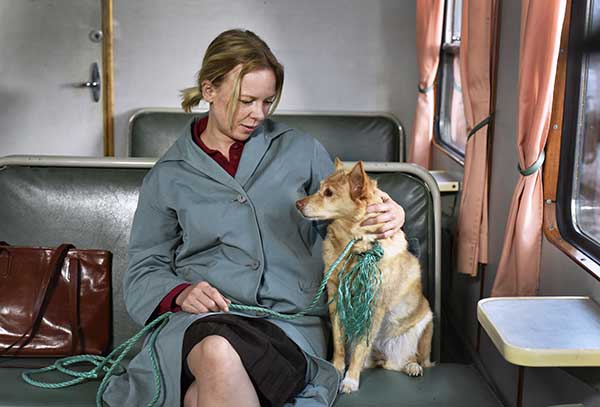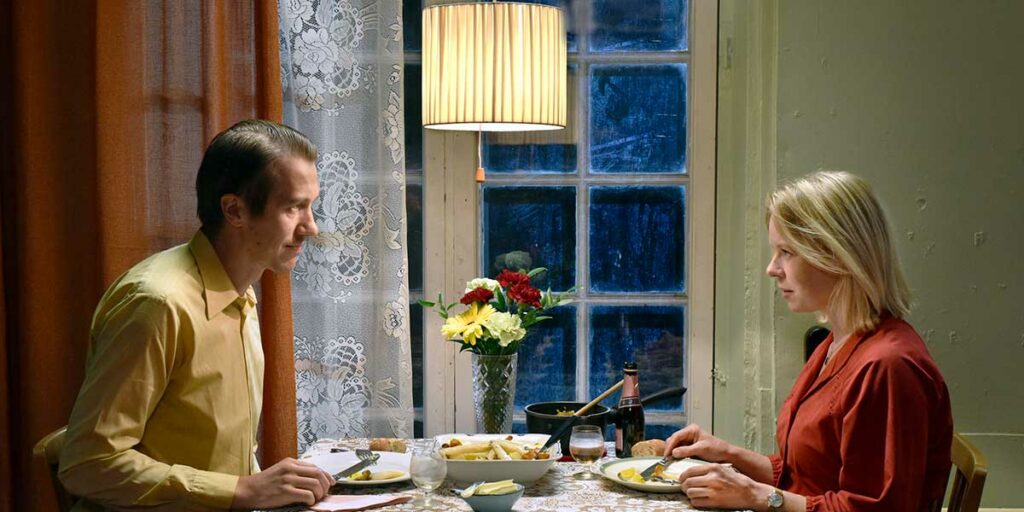33 years later, Aki Kaurismäki continues his Proletariat series with Fallen Leaves, a hilarious and winning deadpan delight.
Finnish filmmaker Aki Kaurismäki proves he is still one of the most singular auteurs working today with his newest release, Fallen Leaves. His latest is one of his most playful films yet, contains one of his funniest scripts, and sits up there with other Kaurismäki masterpieces such as The Match Factory Girl (1990). Fallen Leaves flits between devious comedy and striking emotion with such consummate ease that it is startling; Kaurismäki is one of few directors who can achieve such grand strokes so seamlessly. At first glance, Fallen Leaves might feel minimalist, such is the straight-faced line delivery and static camerawork, but in truth, this is a film of deep, rich imagery.
Fallen Leaves tells a concentrated tale, one that is small in scope but features seismic shifts and moments for its protagonists, who are Ansa (Alma Pöysti, Tove) and Holappa (Jussi Vatanen, The Unknown Soldier). Both in their Kaurismäki film debuts, the actors deliver stunning performances of forceful deadpan humour and austere sentiment—although these more emotional aspects still hit hard. Ansa and Holappa are both single and residing in Helsinki; the former loses her zero hour contract job at a supermarket, whilst the latter similarly flits from job to job, always getting low pay and working long hours. The atmosphere, as it so often is in a Kaurismäki film, is thick with loneliness and depression, but also some form of odd but comforting hope.
After a chance meeting in a bar, Ansa and Holappa begin a relationship. There are bumps along the way: Holappa loses her phone number; his struggles with alcoholism causes serious concern for Ansa; a sudden train accident is the most amusing and alarming moment in this couple’s journey. Fallen Leaves deals with their knotty lives and the problems that inhibit them with real intelligence and nuance. The depictions of alcoholism and unemployment are hugely resonant, and when their true impact on the characters shines through, the cracks in those deadpan faces strike an alarmingly emotional chord.

Long-time Kaurismäki collaborator DOP Timo Salminen enhances Fallen Leaves’ complexity. The world and style are rich and detailed, whether it’s by capturing Ansa alone at a pivotal moment with a loving couple in the background or turning an eye to the ugly, heartless side of industrialisation. When the comedy takes centre stage, the camera is not just a bystander, but a nifty assistant, moving with brisk pans or slow zooms to enhance a character’s line delivery. More widely, Kaurismäki’s patient, pared back style lets scenes unfurl organically.
Fallen Leaves is as stinging in its social and political satire as ever (perhaps unsurprisingly for a continuation of a series focussing on proletariats), and is very much situated in our present day, with consistent news stories on radio stations giving updates on the Ukraine war. Above all else, Fallen Leaves is remarkably romantic, swooning and melodramatic in its own unique and sparkling way. It is a film that, despite the many depressing aspects, finds hope via love. In the most Kaurismäki way possible, we witness a weird, deadpan but completely believable relationship blossom into something utterly beautiful and moving.
Fallen Leaves was screened at the 2023 BFI London Film Festival on 7-15 October and was released in UK & Irish cinemas on December 1, 2023.

